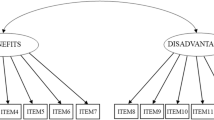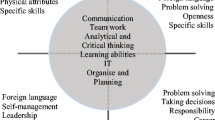Abstract
A key feature of contemporary globalization is the increasing mobility of high-skilled talent. While for many countries in the developing world the loss of such individuals represents a longstanding concern, countries such as China have now developed key policies to harness their overseas talent. The article examines the job-seeking experiences of a key group of high-skilled returnees, after taking advanced degrees in Australia, discussing the outcomes in terms of salaries and length of time to secure employment, as well as analysing their advantages and disadvantages relative to their domestic peers. On the basis of survey and interview data, the views of both returnees and employers are canvassed, as also issues of re-integration and Chinese networks and values.
Similar content being viewed by others
Notes
‘New Argonauts’ is a term used by Saxenian in her work in 2006 The New Argonauts: Regional Advantage in a Global Economy to describe the people who travel overseas in order to gain advanced knowledge and skills, and then either return home to contribute to national development, or shuttle back and forth, making strategic investments and engaging in high-tech transfer.
Hai Dai (seaweed) is a Chinese term developed in early 2000s that referred to overseas-educated graduates who could not find jobs after returning, particularly young returnees with limited overseas qualifications, often at second-tier HEIs) and with little professional experience, but who only (and unrealistically) eyed senior position jobs with very high salary and benefit packages.
The measure of employment used in this study was the percentage of respondents who had confirmed their danwei (or work unit) at the time when students graduated (or left their HEI). Employment also included further study.
References
1000 plan. (2010) ‘China Attracting Global Talent: One Thousand Talents Scheme’, http://www.1000plan.org/groups/viewonetopic/928.
1000 plan. (2011) ‘National innovation environment exhibition — Jiangsu province’, January, http://www.1000plan.org/subject/pages/10, accessed on 15 September 2011.
BBC News. (2010) ‘Foxconn suicides — workers feel quite lonely’, 28 May, http://www.bbc.co.uk/news/10182824, accessed on 15 September 2011.
Beijing Daily. (2007) ‘Haigui jiuyelv ruijian, zhuanjia tixing kanshili bukan ‘biaoqian’’, ‘Returnees’ employability decreases, specialists emphasize on actual skills’, 11 January.
Bell, D. (2010) China's New Confucianism, Princeton: Princeton University Press.
Cai, H. (2010) ‘Deploying the Chinese Knowledge Diaspora: A Case Study of the 111 Project at Peking University’, in K. Yu and A.L. Stith (eds.) Competition and Cooperation among Universities in the Age of Internationalization: Proceedings of the AC21 International Forum 2010 18–21 October 2010, Shanghai: Shanghai Jiaotong Press, pp. 268–288.
Chan, K. (2010) ‘The household registration system and migrant labor in China: Notes on a debate’, Population and Development Review 36 (2): 357–364.
Chang, L. (2008) Factory Girls: From Village to City in a Changing China, New York: Spiegel & Grau.
Chen, H. (2005) ‘Reviewing ‘Hai Gui’ and ‘Hai Dai’, in X. Zhu (ed.) Zhongguo jiaoyu redianwenti toushi (Scaning Chinese Education Issues), Hefei: Anhui Jiaoyu Chubanshe (Anhui Education Publisher), pp. 14–17.
Chen, L. and Hou, B. (2008) China: Economic Transition, Employment Flexibility and Security, Oxford: Chandos Publishing.
China Daily. (2008) ‘Overseas Chinese eye motherland for jobs’, 29 December.
China Daily. (2010a) ‘Catering to the needs of a talented workforce’, 22 December.
China Daily. (2010b) ‘Government to address urban-rural income gap’, 11 September.
China Daily. (2010c) ‘Workers falling through skills gap’, 5 March.
China Daily. (2011a) ‘Chinese firms hot on M&A opportunities’, 18 February.
China Daily. (2011b) ‘Wen emphasizes political reform’, 15 March.
Education Institution of Beijing University. (2009) Report on University Graduates’ Employment Status, Beijing: Information of National Higher Education Students and Employment Guidance Center.
Goodman, R. (1990) Japan's International Youth: The Emergence of a New Class of School Children, Oxford: Oxford University Press.
Goodman, R., Imoto, Y. and Toivonen, T. (eds.) (2011) A Sociology of Japanese Youth: From Returnees to NEETs, London: Routledge.
Hao, J. (2011) ‘Career development of high-skilled returnees: A case study of Australian university graduates’, Ph.D. dissertation, The University of Sydney (in progress).
Harvey, D. (2005) A Brief History of Neoliberalism, Oxford: Oxford University Press.
Hessler, P. (2001) Rivertown — Two Years on the Yangtze, New York: Harper Collins.
Hessler, P. (2006) Oracle Bones — A Journey between China's Past and Present, New York: Harper Collins.
International Herald Tribune (IHT). (2011a) ‘Shanghai wants global listings in 2011’, 17 January.
International Herald Tribune (IHT). (2011b) ‘Chinese bank starts push in Europe with Paris glitz’, 20 January.
International Talent. (2010) ‘Recruitment of overseas-educated talents’, 7 January.
Lee, S. and Eyraud, F. (eds.) (2008) Globalization, Flexibilization and Working Conditions in Asia and the Pacific, Oxford: Chandos Publishing.
Leonard, M. (2008) What Does China Think?, London: Fourth Estate.
Lian, S. (2009) Ant Tribes, Guilin: Guangxi Normal University Press.
Louie, K. (2006) ‘Returnee scholars: Ouyang Yu, the displaced poet and the sea turtle’, New Zealand Journal of Asian Studies 8 (1): 1–16.
Louie, K. (2011) ‘Confucius the chameleon; dubious envoy for ‘brand China’’, Boundary 2 38 (1): 77–100.
Min, W. (2004) ‘Chinese Higher Education’, in P.G. Altbach and T. Umakoshi (eds.) Asian Universities: Historical Perspectives and Contemporary Challenges, Baltimore: The Johns Hopkins University Press, pp. 53–84.
Ministry of Education. (2011) ‘Dual increase in numbers of students both studying abroad and return’, 2 March, http://www.moe.gov.cn/publicfiles/business/htmlfiles/moe/moe_1485/201103/115528.html, accessed on 15 September 2011.
Namgung, S. (2009) ‘Returning scholars in Korean higher education: A case study of internationalisation of higher education’, Unpublished Ph. D., University of Sydney.
National Bureau of Statistics of China. (2009) Monitoring Report on Rural Workers, Beijing: NBS.
New York Times. (2010) ‘University graduates face hopeless odds’, 12 December..
OECD. (2008) OECD Reviews of Innovation Policy: China, Paris: OECD.
Pendlebury, D. (2010) ‘Reflections on research performance measures and the rise of Asia’, International Higher Education 59 (Winter): 6–7.
People's Daily. (2011) ‘China's February FDI up 32.2% year on year’, 15 February, http://english.peopledaily.com.cn/90001/90778/98505/7320475.html.
Saxenian, A. (2006) The New Argonauts: Regional Advantage in a Global Economy, Cambridge: Harvard University Press.
Shenzhen Post. (2010) ‘Foxconn suicides’, 27 May, http://www.szcpost.com/2010/05/foxconn-suicides.html, accessed on 15 September 2011.
State Council. (2006) National Plan for Medium and Long-Term Scientific and Technological Development (2006–2020), Beijing: China Legal Publishing House.
State Council. (2010a) National Plan for Medium and Long-Term Human Resources Development (2010–2020), Beijing: China Legal Publishing House.
State Council. (2010b) National Plan for Medium and Long Term Education Reform and Development (2010–2020), Beijing: China Legal Publishing House.
Thomson Reuters. (2009) ‘China: Research and collaboration in the new geography of science’, http://researchanalytics.thomsonreuters.com/grr/, accessed on 15 September 2011.
Times (the). (2011) ‘De Beers thrives on Chinese appetite for diamonds’, 12 February.
UNESCO. (2010) UNESCO Science Report 2010, Paris: UNESCO.
Wang, B. (2010) Chinese College Graduates’ Employment Annual Report (2010), Beijing: Social Sciences Academic Press (China).
Wang, W. (2011) ‘Grads looking past Beijing’, China Daily, 14 March, M1.
Welch, A. and Cai, H. (2011) ‘Enter the Dragon: The Internationalization of China's Higher Education System’, in J. Ryan (ed.) China's Higher Education Reform and Internationalization, New York: Routledge, pp. 9–33.
Welch, A. and Hao, J. (2012) ‘Returnees and diaspora as sources of innovation in Chinese higher education’, Frontiers of Education in China (in Press).
Welch, A. and Zhang, Z. (2007) ‘The Chinese Knowledge Diaspora — Communication Networks among Overseas Intellectuals’, in D. Epstein, R. Boden, R. Deem and F. Rizvi (eds.) Geographies of Knowledge, Geometries of Power: Framing the Future of Higher Education, London: Routledge, pp. 338–354.
Welch, A. and Zhang, Z. (2008) ‘Higher education and global talent flows: Brain drain, overseas Chinese intellectuals, and diasporic knowledge networks’, Higher Education Policy 21 (4): 519–537.
Whyte, M. (1993) ‘Deng Xiaoping: The social reformer’, The China Quarterly (135): 515–535.
Xu, S. (2011) ‘Bridging the East and West Dichotomy: Harmonising Eastern Learning with Western Knowledge’, in J. Ryan (ed.) Education Reform in China: Changing Concepts, Contexts and Practices, London: Routledge, pp. 224–242.
Yang, R. and Welch, A. (2011) ‘A world-class university in China? The case of Tsinghua’, Higher Education, published online on 22 July, http://www.springerlink.com/content/h626710mt03132m6/fulltext.html.
Zweig, D. and Han, D. (2008) ‘‘Sea turtles’ or ‘seaweed?’ the employment of overseas returnees in China’, http://www.cctr.ust.hk/articles/pdf/WorkingPaper24.pdf, accessed on 15 December 2008.
Author information
Authors and Affiliations
Rights and permissions
About this article
Cite this article
Hao, J., Welch, A. A Tale of Sea Turtles: Job-Seeking Experiences of Hai Gui (High-Skilled Returnees) in China. High Educ Policy 25, 243–260 (2012). https://doi.org/10.1057/hep.2012.4
Published:
Issue Date:
DOI: https://doi.org/10.1057/hep.2012.4




